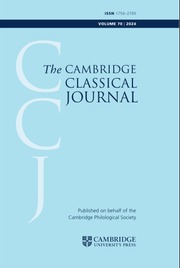Article contents
PROTAGORAS AND THE BEGINNINGS OF GRAMMAR
Published online by Cambridge University Press: 03 August 2021
Abstract
Offering a re-evaluation of all the available evidence, including passages from Aristotle's Rhetoric, Poetics and Sophistici Elenchi, Diogenes Laertius’ biographical sketch as well as the grammar scene in Aristophanes’ Clouds, this article argues that Protagoras’ engagement with grammatical questions must have been more sophisticated and thorough than is often assumed. In Protagoras’ discovery of grammatical gender, formal considerations – most likely inspired by the analysis of personal names – played a more fundamental role than semantic ones, and his typology of πυθμένες λόγων equally presupposes the formal recognition of at least verbal mood, if not also tense.
- Type
- Research Article
- Information
- Copyright
- Copyright © The Author(s), 2021. Published by Cambridge University Press on behalf of The Cambridge Philological Society
Footnotes
We would like to thank the Amsterdamse Hellenistenclub and audiences in Heidelberg, Oxford and Pennsylvania for their comments on earlier versions of this paper and Felix Budelmann and Jonathan Griffiths for answering specific queries; we also thank two anonymous referees for their incisive feedback.
References
Works cited
- 2
- Cited by




